Books
An Interview with Michael Connelly
When Michael Connelly launched his latest Harry Bosch book The Wrong Side of Goodbye here in the UK ahead of America, I jumped at the chance to interview him. But as an author who has sold sixty million books and had his work adapted to the big and small screens, he’s been interviewed many times. And as a former crime reporter with the LA Times, he has led many fascinating interviews himself. I couldn’t help feel both daunted and excited… and compelled to ask him about that other city, six thousand miles away.
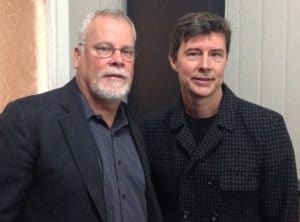 DP: Welcome to London, Michael.
DP: Welcome to London, Michael.
MC: Thank you.
DP: Being a reporter for the LA Times must have given you many things, not least a grasp of the geography and key aspects of Los Angeles, which is such a vast and fascinating place. I believe you’ve described LA as your muse?
MC: Being a journalist always makes you a quick study of wherever you’re at. You’re out all the time and seeing places that normally you wouldn’t get to see. It gives you an unusual level of insight into any place.
DP: If someone had a couple of hours to kill in LA, what would you suggest they do?
MC: I’d go up Pacific Coast Highway and take Sunset Boulevard, east. Sunset goes all the way from the ocean to Downtown LA. It also goes through different social strata – Beverly Hills, several barrios; it gives you a very good sense of the city. There are plenty of places to stop and eat, but because of the traffic, just driving it may take two hours. Downtown LA, at the far end, has changed a lot. It used to be a no man’s land. Now there are lots of people living there; chefs are creating great new restaurants. But you’ve still got some of the old LA left there, too.
DP: I’d love to come back to Downtown LA, where a pivotal scene in your latest book is set. But now you live in Florida. Does that give you a different perspective on LA? A different depth-of-field, if you will?
MC: Really I have a foot in both camps, as I keep a home in both places. So I’m still in LA a lot. But I do like to get what I need there in terms of research, then go back to Florida to write it. As a writer, I’m always trying to mix things up. When I lived in LA full time, I moved often – fourteen different neighbourhoods in sixteen years.
DP: Wow. Like Raymond Chandler – who you pay homage to in The Wrong Side of Goodbye. I believe Chandler moved around so much that no one knows all of the places he lived across Los Angeles. LA comes across as such a restless place, a place always in motion. No wonder the motion pictures grew up there.
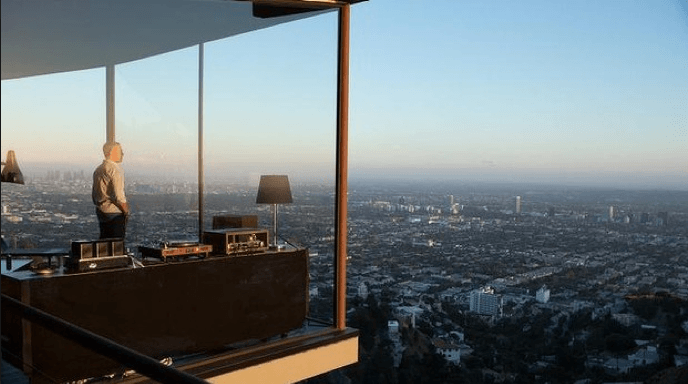
On the set of TV series Bosch: the eponymous detective’s house, looking out over LA
MC: It’s a destination city – a suitcase city. People pack their hopes and dreams in a suitcase, because wherever they’re coming from, it’s not working. I’m one of those people. I wrote a couple of novels in Florida and knew they weren’t good enough to be seen or sent out. I knew it wasn’t happening for me back home, so I decided to change my life and move three thousand miles. I’m an example of what drives people to Los Angeles.
DP: And it worked for you. But I read somewhere that, for example, there are 100,000 or so people in the Screen Actors’ Guild, and only two thousand – two per cent – are working at any one time. And of those working, only a tiny number earn anything like the amounts you see in the Hollywood gossip pages.
MC: That would extend to the Writers’ Guild, Directors’ Guild – all of those guilds.
DP: That elusive promise of celebrity pulls in so many people, yet it also creates enormous tensions between expectations and reality, which you’ve used with key characters in your books, for example Regina Campo in The Lincoln Lawyer [the victim that the trial revolves around].
MC: LA is a long shot city, and those who make that shot – you can tell. You can see very clearly who’s made it and who hasn’t.
DP: There’s a book called Fame: The Frenzy of Renown that talks about it in terms of the possibility of a secular immortality. So someone like John Wayne doesn’t just live on in signs to an airport [named after him], but also in the popular consciousness.
MC: It’s an aura you grow up with – TV, the movies: this picture of a golden city. Usually writers are not the celebrities in Los Angeles, but there is some kind of golden promise. Also, the city sits at the edge of the continent.
DP: The frontier?
MC: Right, the idea that things are still possible out there. The idea that it’s relatively unsettled, that there’s space, room for you … the possibility of creative fulfilment.
DP: I know that you’ve credited your father for a lot of your success. I believe he was an artist, but put that aside to raise your family. I seem to recall you saying he gave you both a reverence for the arts and also a practical ethos for improving your chances of success. Starting out as a crime reporter, for example.
MC: Right, right.
DP: I don’t want to give any spoilers, but there’s a scene in The Wrong Side of Goodbye, set in the Downtown Art District, where Bosch and [defense attorney] Mickey Haller track down a woman who may be about to come into some money. The dialogue is so interesting to me because of the reverence for art it reveals:
Bosch: She’s an artist. Artists are supposed to stay hungry.
Haller: That’s bullshit. That’s a myth invented to keep the artist down because art is powerful. You give an artist both money and power and they’re dangerous.
MC: There’s some of that [reverence], but there’s also some of my own struggle. I’m one of the lucky people who found fame and fortune – one of the very small percentage. So now I struggle with whether I should feel guilty…
DP: Like survivor’s guilt, for the ones who didn’t make it?
MC: I’ve known many LA-based writers, every step of my way. And some have had success and some have had none, and a lot of the time it has nothing to do with whether they’re talented or not; there’s a level of talent with all of them. I truly believe that to have the kind of success I’ve had, about a third of it is talent. A third is luck, and a third is smart choices you make in who you surround yourself with and who you connect to.
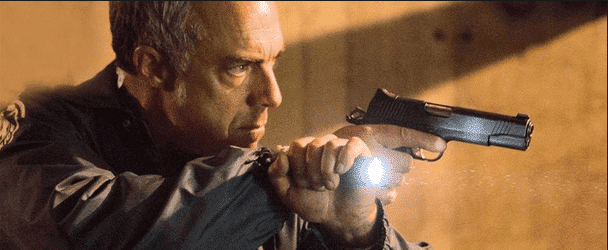
Titus Welliver in the title role for the Amazon Studios adaptation, Bosch
DP: It sounded like you struggled with Hollywood for years when the screen rights to Bosch were tied up. It sounded like the only power novel writers have in Hollywood is deciding who to give power away to [i.e. by selling the film rights].
MC: It wasn’t really a struggle, because the books were always the thing for me, and the books were doing well. They were growing and my career was growing, too. In the early stages, my goal was to get out of my day job and become a full time writer, so I took money from Hollywood to facilitate that. My writing improved as soon as it became my full time focus and I wasn’t going to work every day to write something else. It’s a deal with the devil I’d do again.
DP: I see…
MC: It did mean that Bosch was out of my reach for many years, but as my book profile rose, I reached a point where I would either make a deal I wanted to make or I wouldn’t make one at all. That was the case with The Lincoln Lawyer [2011, featuring defense attorney Mickey Haller], where I didn’t take big money, I took little money – because I trusted the film makers. It was a movie I was very happy with, and that was the first time my success in the book business allowed me to make the right choices in Hollywood. Then the rights to Bosch finally came back to me after a legal battle.
DP: Meanwhile, things had evolved; the TV series had become the preferred vehicle for long-form examination of character.
MC: Yeah, so when I got the character back, that’s what I told my representatives – that I’d rather do something in TV if something interesting came along.
DP: And the deal with Amazon Studios sounded great for allowing you to have an ongoing involvement… I wanted to ask you about the casting: when did you know that Titus [Welliver] was the right actor for Bosch?
MC: I’d seen him in a one-hour show called Touch with Kiefer Sutherland, where he was a guest star playing a guy with Post Traumatic Stress Syndrome. It was a very subtle performance in his eyes. And I thought, he’s projecting the interior Bosch perfectly.
DP: How much have you been involved in the screen writing?
MC: My main involvement is in deciding with Eric [Overmyer from The Wire] what we’re going to do each season. So I write ‘a Bible’ – a sixty-page summary of what the season should cover, and Eric breaks it down into ten episodes. They become detailed outlines that we take into the writing room and discuss with all the writers. We put cards up on the wall; the outlines can change quite a bit. Then we divvy up the scripts… I’ve written five or six now, usually with another writer.
DP: I guess it’s different to books in that it requires you to write more points of view… although you have switched between points of view in some of your books, such as The Scarecrow [2009, featuring journalist character Jack McEvoy].
MC: Bosch books are usually just from his perspective. Clearly these have to be adapted as we can’t have Bosch in every scene or we’d end up killing Titus with so much work. And of course we’re adapting to contemporary LA. The earlier Bosch books date back to the ‘90s.
DP: I know you insisted that every shot be in LA, and boy has that worked out. I believe you were the first production team to film in Hollywood Police Station.
MC: We filmed in three LA police stations, the real crime lab, police head quarters. When word gets out that we’re filming Bosch, we’re often invited to film in places.
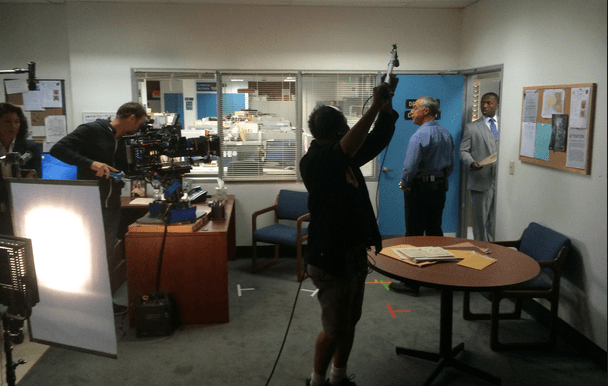
DP: And that view from his house… 180-degrees. In some shots you can see the ocean.
MC: That’s not the view in the books. It’s a little over-the-top for a detective.
DP: He did get a chunk of money from Hollywood in the story early on, though.
MC: True, and inside, that house is tiny. It shakes when you walk around in it.
DP: Can you give us a hint of what happens to Harry in series 3?
MC: It’s been fulfilling and very touching. We’ve gone back to the first book [The Black Echo]. That first book is very interior [to Bosch], which is harder to adapt, but we feel confident that we’ve established his character well enough now to go back to it. The Black Echo was published 25 years ago in January, and it opens with a chapter about a kid, a graffiti artist, who witnesses a murder. When I wrote that chapter, I didn’t even know if it would get published. I’d written two books before that hadn’t gone the distance. We filmed the scene a month ago under a freeway underpass; I was there that night. It was filmed perfectly in concert with the book. It felt like I was walking on a cloud.
DP: Incredible. Has series 3 wrapped?
MC: We’re on episode 8, so we’re almost done.
DP: Well I know you’ve got a few books to sign here, so we’d better wrap too. It’s been a privilege, Michael, and an inspiration.
MC: Thank you.
Michael Connelly has sold sixty million books, seen his work translated into 39 languages and won numerous literary awards. There have been multiple screen adaptations including The Lincoln Lawyer starring Matthew McConaughey and Bosch, featuring Titus Welliver. He now divides his time between Florida and Los Angeles.
Interview by Daniel Pembrey, author of The Harbour Master – available at 99p for a limited time only.
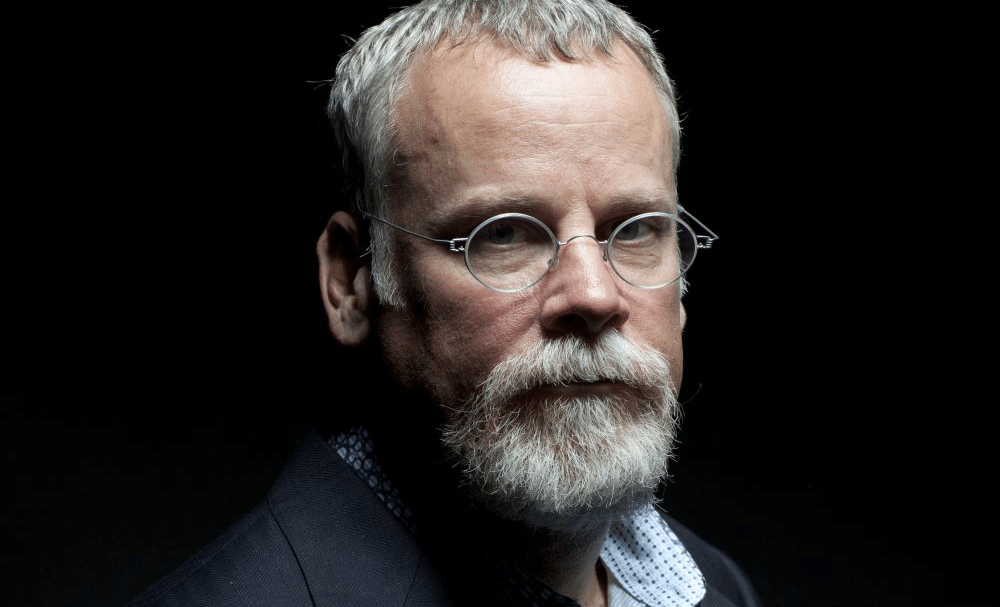

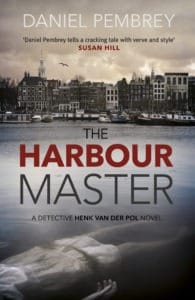
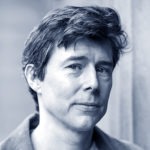
Please note: Moderation is enabled and may delay your comment being posted. There is no need to resubmit your comment. By posting a comment you are agreeing to the website Terms of Use.